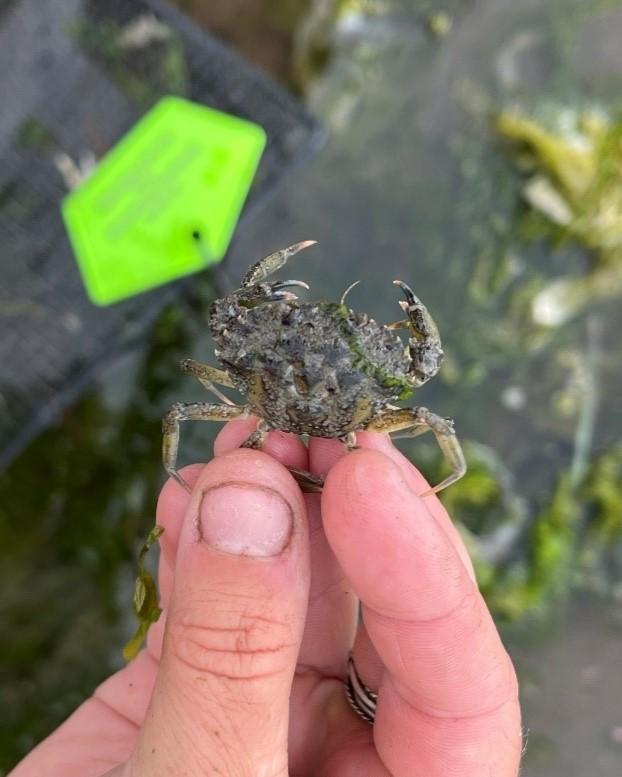Photos
Click to display full size or right-click to save to your device.
News release May 23, 2025
Contact: Raquel Crosier, European Green Crab Emergency Incident Commander
Media contact: Chase Gunnell, 360-704-0258
OLYMPIA – The Washington Department of Fish and Wildlife (WDFW) has captured invasive European green crabs (EGC) at two new locations between northern Hood Canal and Admiralty Inlet during an early detection trapping effort.
WDFW Aquatic Invasive Species (AIS) Division crews working in collaboration with the Port Gamble S'Klallam Tribe caught two of the green crabs near Port Gamble this week. Another green crab was caught in Races Cove west of Hansville. These detections are the first time the crabs have been found in WDFW’s South Central Puget Sound Management Area for EGC control.
“We designed our early detection monitoring to identify European green crabs in areas where they’re most likely to spread next,” said Raquel Crosier, the state’s European Green Crab Emergency Incident Commander and a WDFW Aquatic Invasive Species management coordinator. “While these new detections are disheartening, finding them early gives us the best chance at suppressing the population and preventing further spread into southern Hood Canal and Puget Sound.”
WDFW, the Port Gamble S’Klallam Tribe, other co-managers, and permitted partners are planning additional collaborative trapping events this summer to assess the number of EGC in the area and to remove as many as possible.
The European green crab is a globally damaging shore crab species that threatens native shellfish, estuary habitats, eelgrass, aquaculture industry and businesses, and other tribal, cultural, economic, and environmental values.
WDFW published a long-term management plan to control this invasive species in September 2024 following input from dozens of co-managers, tribes, and partners.
A map showing EGC detections and WDFW monitoring efforts in 2024 is available online (PDF), as well as a map showing all EGC management areas (PDF). An interactive green crab catch count and more information is available on WDFW’s EGC online hub.
“Thanks to continued funding from the Washington State Legislature, WDFW, along with our co-managers and partners, is working to reduce the spread of European green crabs and keep populations low enough to prevent harm to critical nearshore habitat, fisheries, shellfish aquaculture, and cultural resources,” said Incident Commander Crosier.
More than 1.7 million EGC have been captured and removed from Washington waters since a Governor’s emergency order was declared in early 2022 directing state agencies and partners to prioritize coordinated efforts to control invasive green crabs on the Washington Coast and within Washington’s portion of the Salish Sea.
WDFW is also coordinating with Canada, Alaska, Oregon, and California on invasive species management efforts throughout the West Coast, as well as to request additional federal support.
Reporting European green crabs
If you find a suspected European green crab or its shell in Washington, take photos and report it as soon as possible at wdfw.wa.gov/greencrab or through the Washington Invasive Species Council’s WA Invasives mobile app. Crab identification guides and resources are also available on the European green crab online hub and the WDFW EGC webpage.
As a prohibited invasive species, it is illegal to possess a live EGC in Washington. Currently, WDFW is not asking the public to kill suspected EGC. This is to protect native crabs, which are often misidentified. More information on EGC regulations is available on WDFW’s webpage and in the Washington Sport Fishing Rules.
Targeting EGC with traps requires a permit from WDFW. For those who own or manage shellfish beds, beaches, or tidelands, support and permits for European green crab control may be available. Please contact ais@dfw.wa.gov.
The Washington Department of Fish and Wildlife works to preserve, protect and perpetuate fish, wildlife and ecosystems while providing sustainable fish and wildlife recreational and commercial opportunities.
